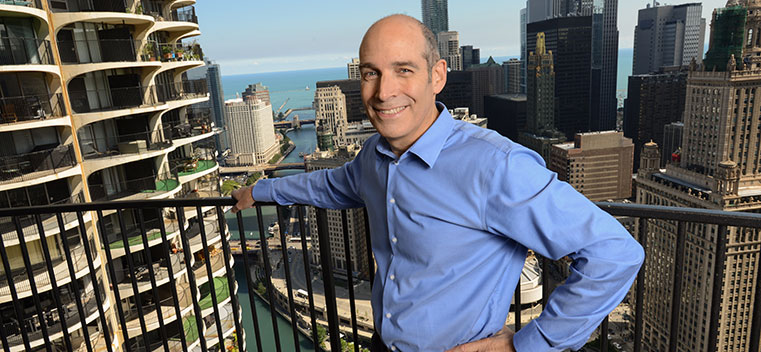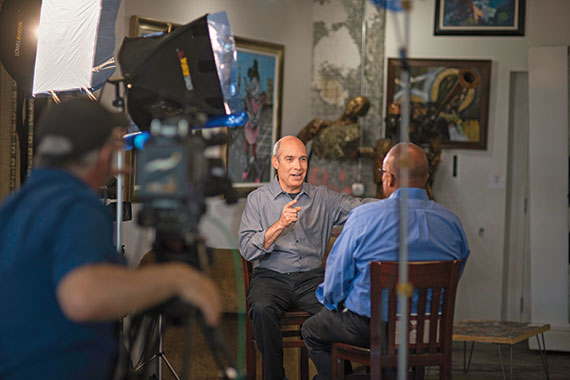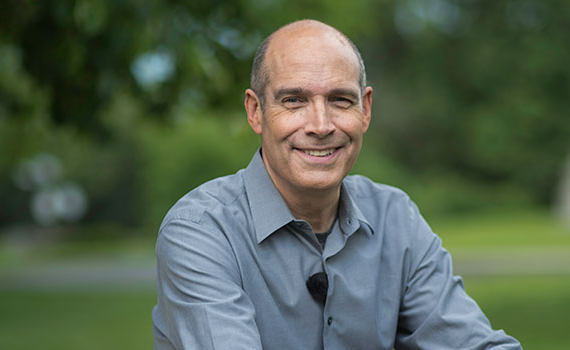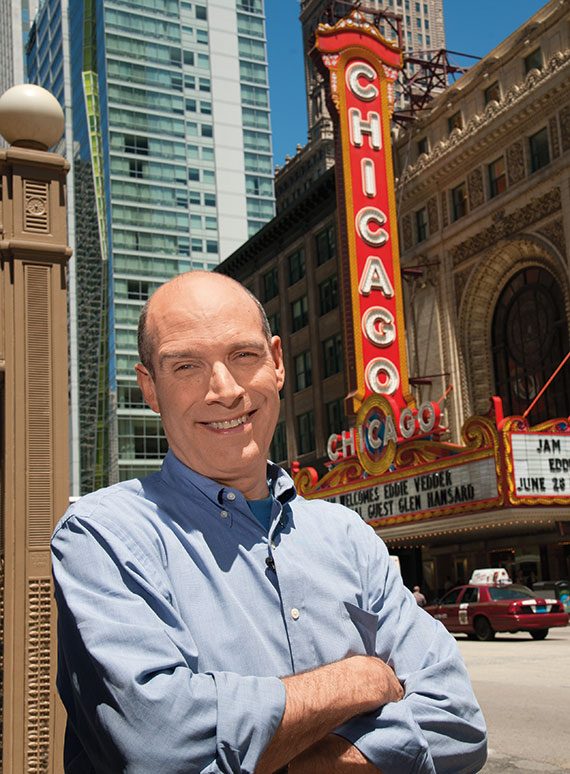
Ask Geoffrey
Related Articles
Elizabeth Canning Blackwell ’90 is a freelance writer in Glenview, Ill.
Tell us what you think. E-mail comments or questions to the editors at letters@northwestern.edu.
Find Us on Social Media
No matter how obscure the question, nothing about Chicago’s history stumps WTTW’s Geoffrey Baer, the Windy City’s favorite TV tour guide.
Geoffrey Baer is sitting in a McDonald’s on Chicago’s South Side, waiting for his close-up. Such is the not-so-glamorous reality of a career in documentary television. In his more than two decades at Chicago’s public television station, WTTW, Baer ’85 MA has gotten used to working around distractions, whether it’s pedestrians blocking a shot, honking car horns or curious gawkers.
Today Baer and his crew are contending with the city’s notoriously unpredictable weather. An outdoor interview in Bronzeville, a neighborhood once known as “the Black Metropolis,” is being set up (for an upcoming special about Chicago’s South Side) in front of a statue that commemorates the Great Migration of African Americans from the South.
But just as the cameras are in place and the microphones are checked and the producer gives Baer the go-ahead to start, it begins to rain. Baer is sent back to McDonald’s, where the waiting continues.
Chicago being Chicago, the clouds are soon replaced by an almost blinding sunlight. Baer rushes into action, responding cheerfully to onlookers who ask what he’s doing, seemingly unfazed by the rumbling of passing buses and the sticky, oppressive heat. He gets the interview done in a few takes; the segment, which took more than an hour to prep and film, will run about a minute on screen. Then it’s on to the next location.

Geoffrey Baer interviews author and historian Bernard Turner at Gallery Guichard in Chicago’s Bronzeville neighborhood during the filming for a WTTW special about Chicago’s South Side that is scheduled to air late this fall. Photo by Michael R. Schmidt.
Baer’s combination of open, wide-eyed curiosity and laser-like focus is at the heart of his professional success. An Emmy Award–winning television host, he has starred in more than 20 feature-length documentaries about Chicago, becoming one of the most popular and recognizable figures on the city’s PBS station. His star is also rising on the national PBS network, which aired his first prime-time special, 10 Buildings that Changed America, in 2013; he’s the host and senior editor of a follow-up series on houses, parks and towns that is scheduled to premiere in spring 2016.
Baer describes himself as a former “theater kid” who caught the performing bug in high school, but says he never could have predicted how his career would unfold. “My job is never the same from one day to the next,” he says. “I’m in the studio, I’m writing, I’m filming on location. There are always things to learn, and that’s what makes it exciting and interesting.”
Baer grew up in the Chicago suburbs of Highland Park and Deerfield; his mother was an art and music teacher and his father a CPA. “My mom and dad met at a folk dance, and they were always attending and hosting folk song gatherings, very much part of that 1950s-era liberal world whose stars were people like Pete Seeger and Studs Terkel,” Baer recalls. “My dad was always drawn to creativity and humor. He would sit there watching TV and marveling, saying it looked like so much fun. One day when we were visiting my grandparents, I made some sort of funny remark, and my grandmother bent down, took my face in her hands and said in her Russian/Yiddish accent, ‘Someday you’re going to be on television.’ At the time it seemed more like a prophecy than a compliment.”
“In the best sense of the word, he’s like a kid — he’s not afraid to show his delight over a discovery. His segments are like a cool, adult version of show-and-tell.” — Phil Ponce, host of Chicago Tonight
Baer did his best to make the prophecy come true, majoring in radio/TV/film at Miami University in Ohio, then working at television stations in Cincinnati, Saginaw, Mich., and Philadelphia. By the time he was 25, he was a staff producer of a nightly magazine-format television show in Philadelphia. But he kept wondering what would have happened if he’d pursued a career in theater. That nagging curiosity led him to a master’s program in theater at Northwestern’s School of Communication.
His first months at Northwestern, he says, were life altering — and not in a positive way. “At work, I’d been the young person with a lot of potential,” he says. “Suddenly, in school, I was the old guy at 27. I’d been doing theater all my life, but with very little formal training, and Northwestern was much more academically rigorous than my undergrad experience. I wasn’t prepared at all.”
The class that would be most influential to Baer’s future career was a yearlong survey of theater history, taught by professor Linda Walsh Jenkins. “I’d never really studied history before,” he says, “and I found it fascinating. I was also able to study with other incredible people — David Downs, Ann Woodworth [’75, ’79 MA] and Frank Galati [’65, ’67 MA/MS, ‘71 PhD], who was without question one of the most amazing professors I’ve ever had.”

Geoffrey Baer in Bronzeville, near Alison Saar's Momument to the Great Northern Migration. Photo by Michael R. Schmidt.
***
During his time at Northwestern, Baer led stage crews and directed scenes with undergraduate students, including a group that would go on to form the Lookingglass Theatre Company, which won the 2011 Tony Award for Outstanding Regional Theater.
“Even back then, Geoffrey would get that trademark twinkle in his eye whenever he’d latch onto some branch of theatrical minutiae that captured his attention,” remembers artistic director Andrew White ’87. “He’s always had a keen eye for detail, whether it was in the realm of text, design or architecture.”
Baer supported Lookingglass as a board member from almost the very beginning, attending endless meetings (“Is there any other kind in those early days?” jokes White); volunteering at events; providing financial support; and coming to every show. “He’s always been a tireless ambassador for the company,” says White. “It’s still a delight to see him stroll into our lobby.”
Baer had been offered his old TV producer job in Philadelphia when he finished school, but he turned it down in favor of a part-time position teaching theater at the Chicago Academy for the Arts, a small private high school. “I quickly learned there’s no such thing as a part-time teaching job,” says Baer, who lived in a one-room studio in Rogers Park. “The school was highly dysfunctional and so short of funds that the students would bring their own toilet paper from home to supply the bathrooms. There were a lot of crazy teachers and misfit kids, and I absolutely loved it.”
He stayed at the school for five years. “It was the most incredible, intense experience, a sort of laboratory for me to explore and apply the theoretical knowledge I’d acquired at Northwestern but hadn’t really integrated or fully understood,” he says. Baer also studied theatrical improvisation at Second City and other theaters, approaching the training as a general life skill rather than a route to comedy stardom. “I think everybody should study improv,” he says. “It teaches you how to be in the moment, how to listen and how to be open to what comes next.”
A school field trip led Baer to another opportunity that would have lasting implications for his future career. After chaperoning students on a downtown tour arranged by the Chicago Architecture Foundation (and giving the guide tips afterward on how to better project his voice and control his breathing), Baer decided to follow his lifelong interest in architecture by becoming a volunteer docent.
In 1989, what Baer describes as his “strange set of experiences and skills”— a passion for theater and architecture, expertise in TV production, an ability to improvise solutions on the fly — turned out to be a perfect match for a job opening as an associate producer for arts programs at WTTW. Content as a behind-the-scenes guy, he had no interest or expectation of ever appearing on camera, until one day in 1995, when a man came up to Baer after he’d led a weekend CAF boat tour of the Chicago River.
“He started asking me all kinds of questions,” Baer remembers. “We walked together for blocks afterward, because he wanted to keep talking. At some point he asked what I did for a living, and it turned out he was the newly appointed chairman of the board at WTTW. By the time I got to work the next day, he’d called the station and said we should make the tour a TV show.”
***
That first documentary tour, Chicago by Boat, was such a success that Baer was encouraged to do another. Then another. Today, he’s hosted and written more than 20 such programs, including a quiz show of local trivia and in-depth investigations of the area’s suburbs. According to Julia Maish, WTTW’s manager of media relations, “Geoffrey’s TV tours and Chicago history programs are consistently among our most popular local franchises, and whenever they air during our pledge drives, the DVDs are coveted thank-you gifts. Pledges always increase when his programs are offered.”
But Baer is quick not to claim the limelight for himself. “Although I’m the one you see on screen, these projects are a true collaboration among an amazing group of WTTW colleagues: producers, writers and co-writers, researchers, web teams, camera crews and editors. It takes a village!”
Baer also appears regularly on Chicago Tonight, WTTW’s flagship nightly newsmagazine, answering questions submitted by viewers in a segment called “Ask Geoffrey.” “They’re popular in large part because of Geoffrey’s enthusiasm for the subject matter,” says Mary Field ’76 MS, executive producer of Chicago Tonight. “It’s a cultural history lesson wrapped up in a mini adventure.”
One key to Baer’s appeal is that he’s never been a chauvinistic booster of his hometown; viewers appreciate and trust his warts-and-all approach. “There’s a certain pride I take in the city, but I also see Chicago’s many flaws,” he says. “I’ve never been interested in creating valentines to a particular region. There are so many great stories, good and bad. What’s interesting is the real story.”

While Baer has a full slate of Chicago projects in the works (the boat tour, already remade in 2005, is due for another overhaul because so much has changed along the waterfront), he’s also branching out to a national audience. Following his national prime-time PBS debut in 2013, Baer is now host and senior editor for Ten that Changed America, a follow-up series of one-hour documentaries on 10 influential American homes, city parks and towns, currently due to air in spring 2016. (The episode on homes features the Gamble House, an outstanding example of American Arts and Crafts–style architecture, in Pasadena, Calif., the Langston Terrace public housing project in Washington, D.C., and the 1,000-year-old Taos Pueblo in New Mexico, while the parks show travels from Savannah to New York to Seattle.)
“I used to say the one thing I didn’t like about my job was that I didn’t get to travel,” says Baer. “Be careful what you wish for! By the time this is done, I will have been to almost 20 cities.”
Baer’s whirlwind year has meant less time at his home in Evanston with his wife, Amelia Kohm, a researcher in child policy at Chapin Hall at the University of Chicago, and their 8- and 10-year-old daughters. It’s allowed less time for competitive sailing, a sport he learned at Northwestern and still enjoys to this day as a crew member, including participating in the Chicago Yacht Club Race to Mackinac. The fuel that gets him through his punishing schedule is his love for what he does and his desire to share what he’s learned.
Phil Ponce (see "Ponces Duel, News at 10," summer 2008), host of Chicago Tonight, says Baer’s passion is at the heart of his appeal. “I love sitting across the table asking Geoffrey questions because his enthusiasm for the stories is so real. You can’t fake this kind of interest year-in and year-out, and Geoffrey’s engagement with the city’s history and oddities is contagious. In the best sense of the word, he’s like a kid — he’s not afraid to show his delight over a discovery. His segments are like a cool, adult version of show-and-tell.”
One of Baer’s pet peeves is over-the-top, Chicago-centric boasting. (“Any city that calls itself ‘world class’ by definition isn’t,” he says dryly.) But he’s happy to point out the qualities that make it distinctive. “There’s no better American city for architecture,” he says. “That’s absolutely a point of pride. You get in almost any taxicab in Chicago, and the driver can tell you about Louis Sullivan and Frank Lloyd Wright and Mies van der Rohe. When I see our lakefront and our skyline, it still fills me with awe and delight.”
And when he looks at the twists and turns of his career, he feels a similar sense of wonder. “I bailed out on a promising commercial television career after just four years to explore theater, not knowing where it would take me,” he says. “For many years, it wasn’t clear. But I’m so glad I took that risk. I’m really proud to work in public media, where we are focused not on the advertisers and stockholders but on creating entertaining content that educates and serves the public good. My unplanned career journey has taken me on many side roads that ultimately led me to a place I really feel I belong.”



 Facebook
Facebook Twitter
Twitter Email
Email


